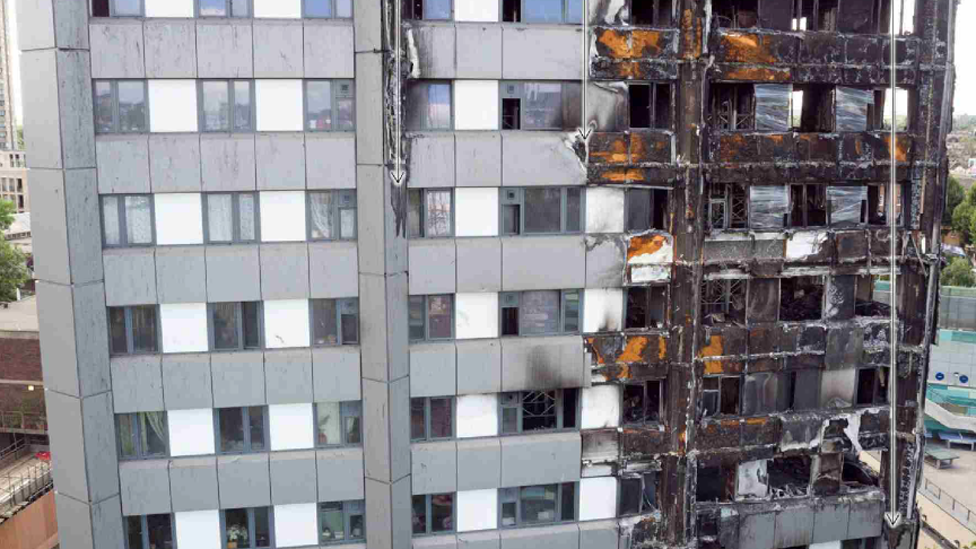Flats cladding: Residents seek action over safety costs in Wales
- Published
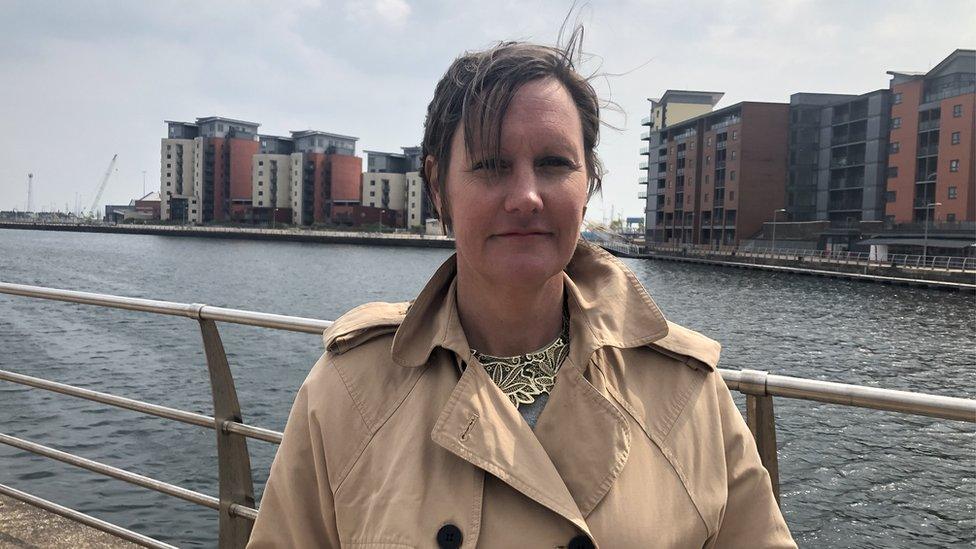
Zoe Griffiths said she and other flat owners were "being accountable for the remediation work out of our own pockets"
People living in flats with extensive fire safety defects are calling on politicians to commit to helping them pay huge remediation costs.
About 50 private residential blocks more than 18m high have combustible cladding and other defects in Wales.
Despite work by some developers, some leaseholders still face spiralling costs to pay for the work.
Ahead of May's Senedd election, parties are promising plans to improve the situation for leaseholders.
Many thousands of flat owners around the UK face huge bills for fire-safety improvements, brought in after 2017's Grenfell Tower fire when flames spread via combustible cladding, killing 72 people.
Zoe Griffiths lives at South Quay near Swansea's marina. The majority of the development was built by Carillion, which went bust in 2018.
Significant fire safety issues have been identified which affects more than 160 units, including combustible cladding and compartmentation defects.
The building's NHBC warranty has expired, which leaves homeowners to pick up the bill of the remediation work.
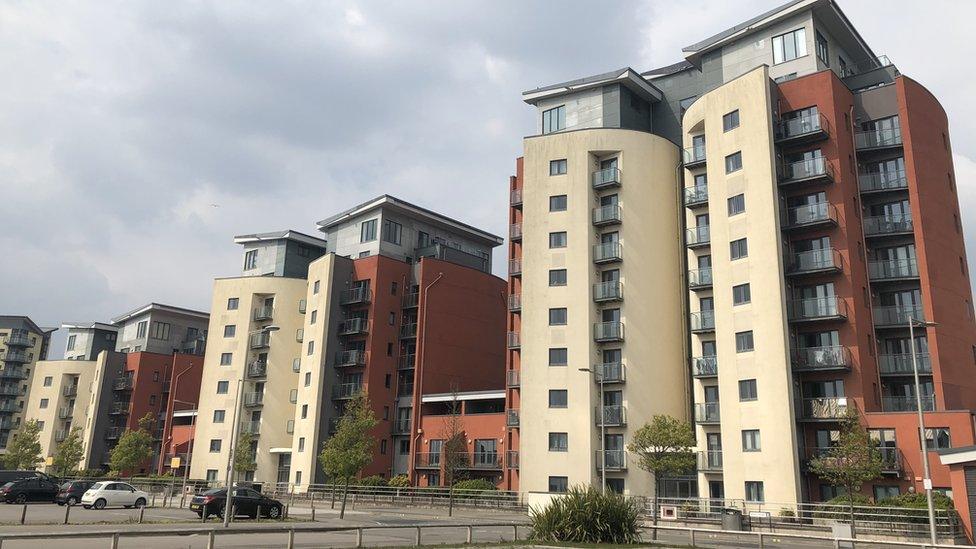
About 160 flats have been affected at South Quay
"We are left being accountable for the remediation work out of our own pockets," said Ms Griffiths.
"The insurance costs from 2020-21 have increased by 371%, our service charges have increased by 167%.
"We're left footing the bill for our cladding - in real terms what that means is we are paying for £335,000 out of our own pockets to meet the new fire regulations."
She said millions of pounds had been pledged last year by the Welsh government but "we haven't seen any of it in the private sector".
"They're very future-focused, but we're seeing no action being present based," said Ms Griffiths.
"We'd like to see the next Welsh government come forward and be supportive of the health and wellbeing, and the safety of all their people and the leaseholders, and put as a priority the spending of the money that should be allocated to the cladding."
Earlier this year, the Labour Welsh government explained that money given to Wales from Westminster through the Barnett formula in 2020 had been put into the effort to tackle the coronavirus pandemic.
In February it said £32m would be committed to address fire safety defects during the 2021-22 financial year.
In England, disagreement continues between the government, opposition parties and members of the House of Lords over who should pay for fire safety work there.
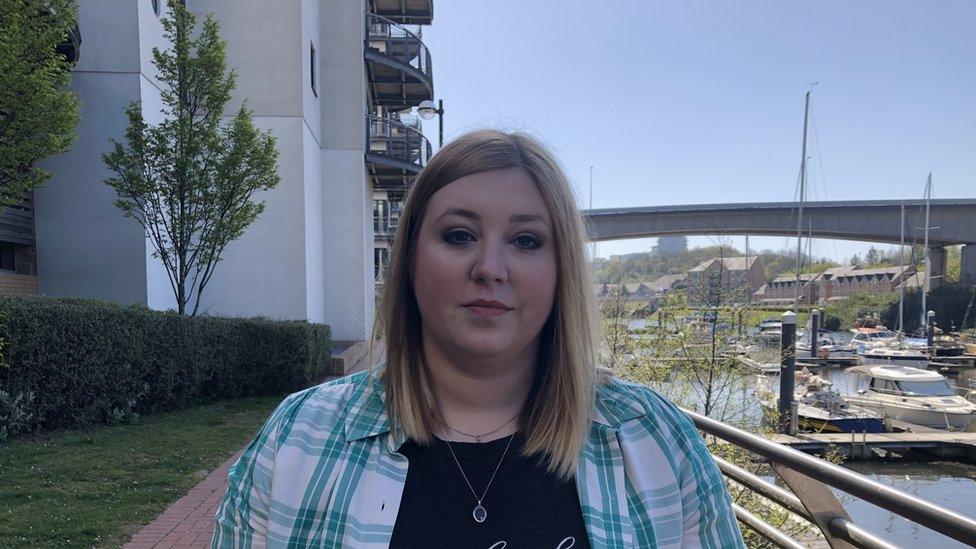
Building insurance has "skyrocketed" at Cardiff's Victoria Wharf development, says Cerys Owen
Residents at the Victoria Wharf development in Cardiff Bay claim not to have seen any of that money, despite ongoing problems.
Following an "intrusive survey" in 2019, the blocks of flats were found to have missing firebreaks and problems with compartmentation, which is when measures are put in place during construction to ensure a fire in one flat is not able to spread.
Resident Cerys Owen, who set up Wales Leaseholder Action Group, said the majority of internal remediation work had been undertaken by the developer, Taylor Wimpey, but external cladding problems remained.
Interim measures such as new fire alarms and a waking watch - people who continually patrol all floors ready to wake up residents if there was a fire - have been paid for by the leaseholders.
Ms Owen said the building's insurance had "skyrocketed as a result of the problems, up from £65,000 for the development to £629,000 this year".
"Per leaseholder that's just over £1,000. So far, I've personally had to pay out around £3,000," she said.
"The estimate to fix everything else in the development is around £28m and that translates to about £60,000 per leaseholder.
"The interim measures in themselves are enough to bankrupt people and put them in a really difficult position so it's not feasible at all that we can pay that £60,000 bill if it lands on our doorstep."
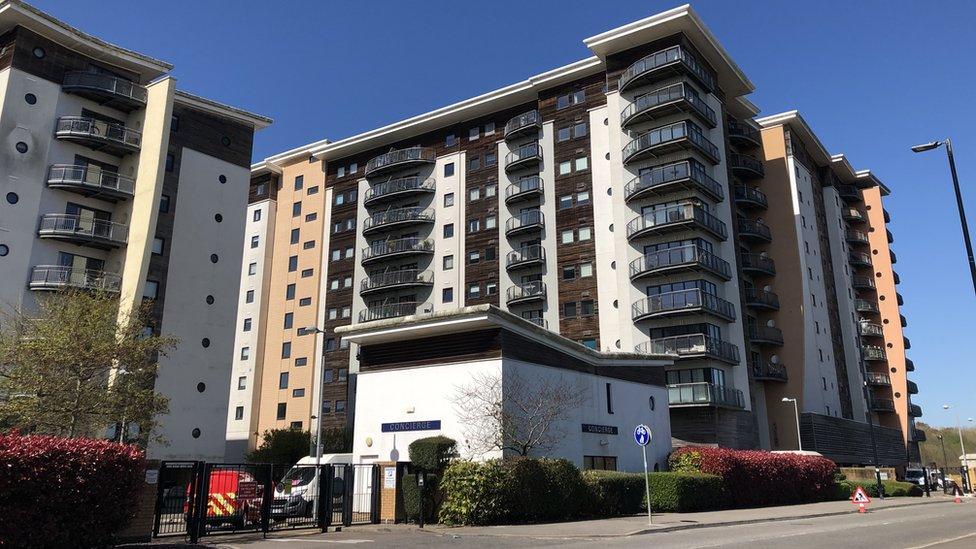
New fire alarms and a waking watch have been paid for by the leaseholders at Cardiff's Victoria Wharf development
Ahead of the Senedd election, Ms Owen said: "The lack of support from Welsh government to date has been really tough for us to accept.
"It's understandable that Covid has been a huge issue for us all.
"But what we hope to see now, and what we hope to see with whoever is voted in after the election, is a Welsh government willing to step up and support us, willing to work with us on any solutions going forward, and fundamentally put the money they have received in place and use it for its intended purpose - to protect us, to help us with all these costs for the fire safety issues which we're facing.
"You know, we've heard from them many times [that] it's unfair we're in this situation and that leaseholders shouldn't pay.
"But we need to see action from whoever is voted in because it's not enough any more to say leaseholders shouldn't pay because we are paying now, so we need to see that support immediately."
What do political parties standing in the Welsh elections say?
If re-elected on 6 May, Welsh Labour said it would create "a fire safety fund for existing buildings".
A spokesman said the party was "committed to the very highest standards of building safety in Wales", and it was proposing a new fire safety regime "to move Wales forward with improved safety of high rise and other buildings, including new duty holder roles, a new process for identifying risk and changes to regulation so that we improve the way we design, build, manage and live in buildings across Wales".
The Welsh Conservatives have criticised the current Welsh government, saying it had "failed to spend monies provided by the UK government to specifically tackle the problem of fire safety in apartment blocks".
The party said if elected it would "establish a fire safety fund to compensate leaseholders for fire safety works and the scourge of tackling unsafe cladding, guaranteeing any Barnett consequentials from the UK government to the fund".
Plaid Cymru said it would "seek the powers to introduce a windfall tax on the profits of large developers, and use the proceeds to solve the problems created by poor builds".
"This will improve safety and avoid owners being trapped into poor quality flats and houses with no recourse, which has been the case with the cladding scandal. We will also improve consumer protection for poor quality in new builds."
The Welsh Liberal Democrats said: "Many people living in high-rise properties across Wales do not feel confident that their property is safe and are worried about potential fire risks.
"It's high time the Welsh government acted to make these homes safe."
Propel, which has campaigned in support of leaseholders facing rising remediation costs, said it would introduce a Housing Justice Act which would include an annual service charge cap for leaseholders, linked to the Consumer Price Index, and it would "stipulate not to grant building contracts to existing developers until they have rectified dangerous fire cladding in previous developments".
It said: "No other party has made this commitment. Propel will not abandon leaseholders living in dangerous flats."
Other parties standing for election, including Reform, have also backed calls to alleviate leaseholders of the financial burden to carry out remediation work.
Related topics
- Published27 April 2021
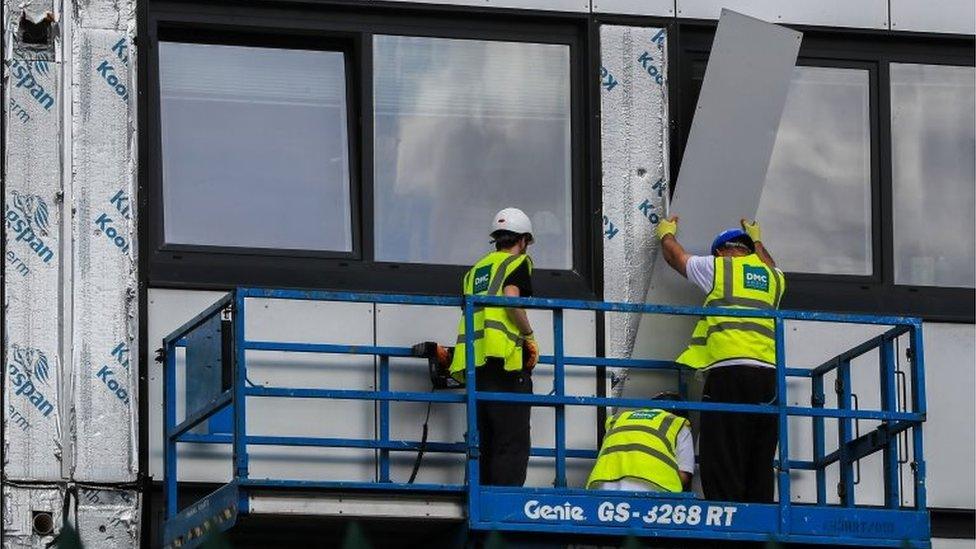
- Published10 February 2021
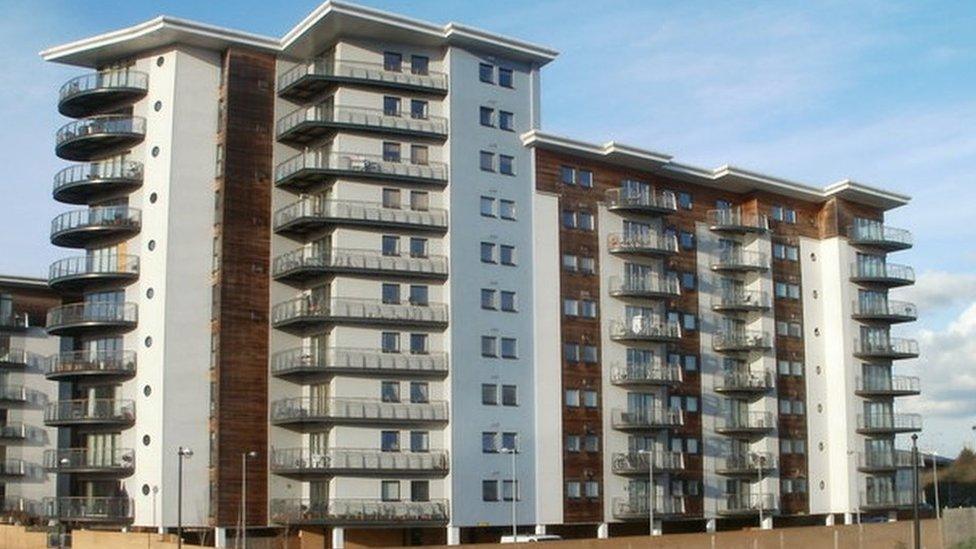
- Published10 February 2021
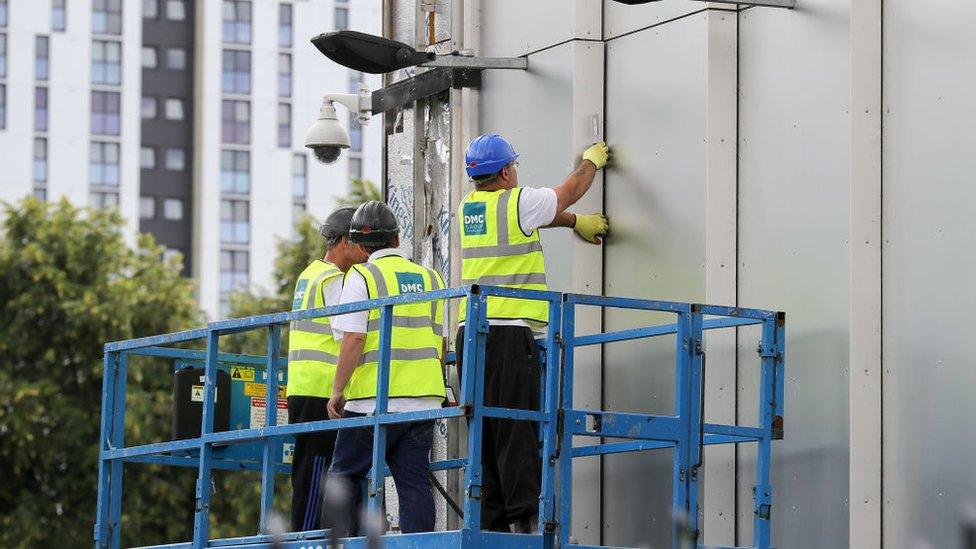
- Published19 August 2020
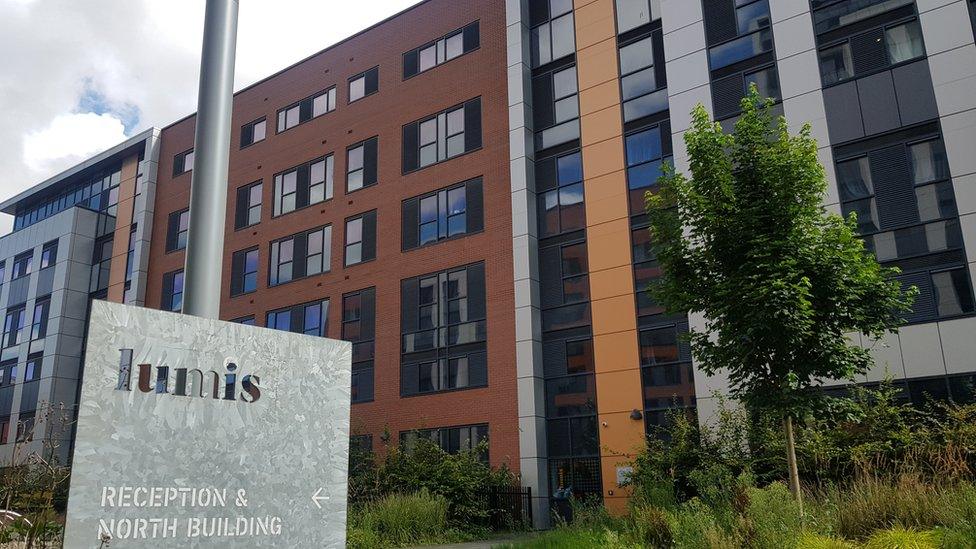
- Published29 October 2019
